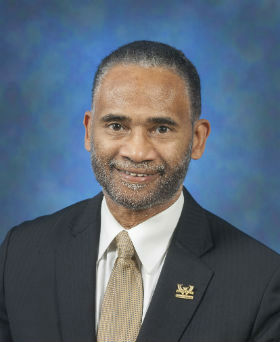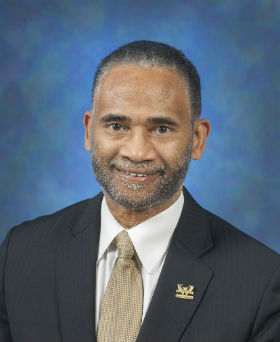Richard Stanley Baker M.D. M.D. (fz5329)
University information
Contact information
Highways to Excellence Curriculum
Richard S. Baker, M.D., is vice dean of Medical Education and professor of Ophthalmology at the Wayne State University School of Medicine. He is a board-certified ophthalmologist and a fellow of the American Academy of Ophthalmology. Dr. Baker has previously held senior leadership positions at Charles R. Drew University of Medicine and Science and at the University of California at Los Angeles. Previous positions at Charles Drew University include university provost, dean of the College of Medicine, president of the Charles Drew University Multi-Specialty Practice Group, chair of the Department of Ophthalmology, associate vice president for Research, associate dean for Research and director of the Charles Drew NIH-RCMI Biomedical Research Center. Previous leadership positions at UCLA include associate dean at the UCLA David Geffen School of Medicine and associate director of the Jules Stein Center for Eye Epidemiology.
Dr. Baker is the founding director of the Drew Health Services Research Center, and co-founder and executive director of the Drew Urban Telemedicine Center of Excellence. He serves on the Board of Directors of the Southeast Michigan Center for Medical Education, the National Medical Fellowships Alumni Association and the Latino Physicians of California. His previous board service includes the Board of Directors of the California Medical Association, the Los Angeles County Medical Association, the Association of Minority Health Professions Schools, the Hispanic Serving Health Professions Schools, the UCLA School of Medicine Board of Visitors, the California Black Health Network, the Drew Economic Development Corp., the Drew Faculty Practice Plan, and founding board member of the Los Angeles Eye Institute.
Dr. Baker has been recognized for his scientific and civic contributions by National Medical Fellowships as a Distinguished Alumnus, the Los Angeles County Board of Supervisors, the National Association of Public Hospitals, the California Legislature, Tavis Smiley/Microsoft, the City of Lynwood and numerous community organizations. He is an elected member of the Phi Kappa Phi national honor society (Public Health) and has been recognized as one of “Americas Top Ophthalmologist” by the Consumer Research Council of America.
A native of Harlem, New York, Dr. Baker received his undergraduate degree in Physics from Stanford University. He was awarded his medical degree by Harvard Medical School, with concurrent doctoral training in Health Sciences Technology from the Massachusetts Institute of Technology. Upon completion of medical school, Dr. Baker was awarded a fellowship at the Joslin Diabetes Center, Harvard Medical School. He then went on to complete an internship in General Surgery at the University of Minnesota. After completion of his internship, Dr. Baker was awarded a National Institutes of Health Fellowship in Biostatistics and Epidemiology at the University of Minnesota. He then completed his ophthalmology residency at the Charles Drew University.
Dr. Baker has served on numerous expert panels for the National Institutes of Health and for the Agency for Healthcare Research and Quality, as well as serving as chair of the Council on Scientific and Clinical Affairs of the California Medical Association. He has been principal investigator of multiple studies and is a published author in the fields of Ophthalmology, Telemedicine, Epidemiology and Health Services Research, with more than 200 scientific publications, book chapters and presentations.

School of Medicine
540 East Canfield, 1207 Scott Hall
313-577-5196 | Fax: 313-577-6474
Richard Baker, M.D., is the senior vice dean of Medical Education for the Wayne State University School of Medicine.
An ophthalmologist, Dr. Baker was formerly executive director of the Center for Health Services Research and chair of the Department of Ophthalmology at Charles Drew University of Medicine and Science. He had a joint faculty appointment at the UCLA David Geffen School of Medicine and was a member of the Jules Stein Eye Institute, where he served as associate director of the Jules Stein Center for Eye Epidemiology.
He held a number of positions at Charles Drew University of Medicine and Science, including provost, dean of the College of Medicine, president of the Charles Drew University Multi-Specialty Practice Group, associate vice president for Research, associate dean for Research, assistant dean for Medical Student Research and director of the Charles Drew National Institutes of Health - Research Centers in Minority Institutions Biomedical Research Center. He also served as associate dean for the UCLA David Geffen School of Medicine.
While provost for Charles Drew University of Medicine and Science, Dr. Baker organized the effort and provided the leadership to address the academic deficiencies that resulted in the university being in noncompliance with Western Association of Schools and Colleges accreditation standards that transitioned the university from probable loss of accreditation to full accreditation in an unprecedented 12 months. He led the development and successful implementation of the first WASC-approved University Academic Plan in the history of the accreditation process. Dr. Baker initiated and led a comprehensive, university-wide, data-driven prioritization, evaluation and resource reallocation process of all academic programs and services, involving all university stakeholders in the process, resulting in explicitly defining the university's primary academic focus, eliminating or suspending academic programs manifesting programmatic misalignment and poor academic or financial performance, and identifying and strengthening key academic programs and services. He achieved first-time accreditation for the university's public health program and first-time reaccreditation of all academic programs.
He also instituted university-wide faculty development, institutional effectiveness, admissions, registrar, student retention, academic personnel, academic budget and finance positions and programs instrumental to accreditation while under a fixed budget and institutional probation. He established a "culture of assessment" by instituting a comprehensive academic program review process and a continuous student learning outcome assessment process. That change included an institutional program review process utilizing external reviewers, evidence-based claims, data-driven decision making, and outcomes-based assessment of student learning outcomes to inform planning and budgets.
Dr. Baker received a bachelor's degree in physics from Stanford University in 1977. He received his medical doctorate degree from Harvard Medical School and from the Massachusetts Institute of Technology in 1984. His postdoctoral training includes a fellowship at the Joslin Diabetes Center, Harvard Medical School and a National Institutes of Health fellowship in chronic disease epidemiology at the University of Minnesota School of Public Health.
The founding director of the Drew Health Services Research Center and co-founder and executive director of the Drew Urban Telemedicine Center of Excellence, Dr. Baker served on the boards of the California Medical Association, the Los Angeles County Medical Association, the Latino Physicians of California and Healthy African American Families. He also served on the boards of the Hispanic Serving Health Professions Schools, the Association of Minority Health Professions Schools, the UCLA School of Medicine Board of Visitors, the California Black Health Network, the Drew Economic Development Corp., the Drew Faculty Practice Plan and the Los Angeles Eye Institute.

UME and Curricular Affairs
Richard Baker, M.D., is the senior vice dean of Medical Education for the Wayne State University School of Medicine.
An ophthalmologist, Dr. Baker was formerly executive director of the Center for Health Services Research and chair of the Department of Ophthalmology at Charles Drew University of Medicine and Science. He had a joint faculty appointment at the UCLA David Geffen School of Medicine and was a member of the Jules Stein Eye Institute, where he served as associate director of the Jules Stein Center for Eye Epidemiology.
He held a number of positions at Charles Drew University of Medicine and Science, including provost, dean of the College of Medicine, president of the Charles Drew University Multi-Specialty Practice Group, associate vice president for Research, associate dean for Research, assistant dean for Medical Student Research and director of the Charles Drew National Institutes of Health - Research Centers in Minority Institutions Biomedical Research Center. He also served as associate dean for the UCLA David Geffen School of Medicine.
While provost for Charles Drew University of Medicine and Science, Dr. Baker organized the effort and provided the leadership to address the academic deficiencies that resulted in the university being in noncompliance with Western Association of Schools and Colleges accreditation standards that transitioned the university from probable loss of accreditation to full accreditation in an unprecedented 12 months. He led the development and successful implementation of the first WASC-approved University Academic Plan in the history of the accreditation process. Dr. Baker initiated and led a comprehensive, university-wide, data-driven prioritization, evaluation and resource reallocation process of all academic programs and services, involving all university stakeholders in the process, resulting in explicitly defining the university's primary academic focus, eliminating or suspending academic programs manifesting programmatic misalignment and poor academic or financial performance, and identifying and strengthening key academic programs and services. He achieved first-time accreditation for the university's public health program and first-time reaccreditation of all academic programs.
He also instituted university-wide faculty development, institutional effectiveness, admissions, registrar, student retention, academic personnel, academic budget and finance positions and programs instrumental to accreditation while under a fixed budget and institutional probation. He established a "culture of assessment" by instituting a comprehensive academic program review process and a continuous student learning outcome assessment process. That change included an institutional program review process utilizing external reviewers, evidence-based claims, data-driven decision making, and outcomes-based assessment of student learning outcomes to inform planning and budgets.
Dr. Baker received a bachelor's degree in physics from Stanford University in 1977. He received his medical doctorate degree from Harvard Medical School and from the Massachusetts Institute of Technology in 1984. His postdoctoral training includes a fellowship at the Joslin Diabetes Center, Harvard Medical School and a National Institutes of Health fellowship in chronic disease epidemiology at the University of Minnesota School of Public Health.
The founding director of the Drew Health Services Research Center and co-founder and executive director of the Drew Urban Telemedicine Center of Excellence, Dr. Baker served on the boards of the California Medical Association, the Los Angeles County Medical Association, the Latino Physicians of California and Healthy African American Families. He also served on the boards of the Hispanic Serving Health Professions Schools, the Association of Minority Health Professions Schools, the UCLA School of Medicine Board of Visitors, the California Black Health Network, the Drew Economic Development Corp., the Drew Faculty Practice Plan and the Los Angeles Eye Institute.
Location
1207 Scott Hall
